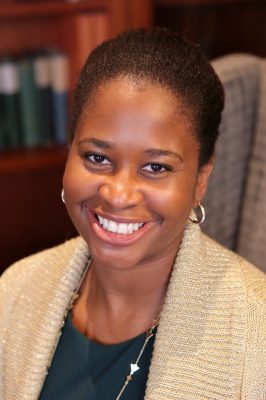
Boston University associate professor Stephanie Curenton aims to enhance classroom conversations for children aged 3–5 in her professional development course, Conversation Compass. One year after receiving a $10,000 grant for the program from BU’s Initiative on Cities, she is preparing to expand the course to benefit children as young as 2 years old.
Curenton, an associate professor at Wheelock College of Education and Human Development, received a grant from BU’s Initiative on Cities last spring to fund her research.
She is currently teaching Conversation Compass in her Jumpstart service-learning class. The BU Jumpstart program is a program that allows Wheelock students to work with children in South End preschools and participate in an early learning program.
Curenton said she developed Conversation Compass while she was a professor at Rutgers University in New Jersey. The program promotes an approach that centers around conversations in early childhood education and looks to enhance communication between teachers and students. Through this approach, Curenton aims to better develop the children’s communications skills.
“The Conversation Compass is a professional development strategy for early childhood teachers,” Curenton said. “It’s focused on sort of helping teachers […] facilitate high-quality conversations in early childhood classrooms.”
Niya Adlersberg, a junior in the College of Arts and Sciences and a research assistant for Curenton, said she believes this research is extremely important.
“Honestly, it’s going to carry on through I think the remainder of how we view education,” Adlersberg said. “The things laid down in early education, especially in the preschool classroom, are later built upon as you go up in schooling.”
The grant will allow Curenton and her team to work with a class of BU Jumpstart students to study how effective the Conversation Compass strategy is for infant toddlers in Jumpstart programs.
“What we are interested in doing particularly with the IOC grant that we got at Boston University is looking at how we can make sure that the strategy is even appropriate for teachers who are teaching infants and toddlers,” Curenton said. “So it’s taking some work that I had already been doing […] and trying it out here in the Boston area.”
The BU Initiative on Cities is interested in conducting research here in Boston, which is why they gave Curenton this grant, she said.
“They have grants, small grants, that they award to faculty members all across the university, to do sort of local-based research in the community, in the Boston area,” Curenton said. “I think [it’s] really important […] that they’re investing in faculty members the way they do so that we can do this sort of community-based work.”
Curenton said this research was made possible by the BU-Wheelock merger last year because BU acquired Wheelock’s Jumpstart program in addition to its own Jumpstart program.
“I think that we have the opportunity here in the new Wheelock College to really make our early education program stronger,” Curenton said.
Adlersberg said Conversation Compass is an important tool to enable teachers to have better, more effective conversations with their students.
“It’s just letting them know, instead of asking children like, ‘Oh, is that a bird you drew?’ Or, ‘Can you tell me about your drawing?’ Those are two different questions that honestly target different language skills,” Adlersberg said. “It can lead to like, a three-minute conversation versus just like, ‘Oh, I guess,’ or ‘No.’”
Sabrina Huang, a junior double-majoring in CAS and Wheelock who also worked with Curenton, said she thinks it is good BU is putting money into research in this field.
“There’s a lot of focus on higher ed and trying to close the achievement gap when you’re older, but what really needs to change is trying to help close that gap when they’re young and in preschool,” Huang said. “So I think it’s really great how BU is investing in this more because that just shows how much they value early childhood education.”






















































































































